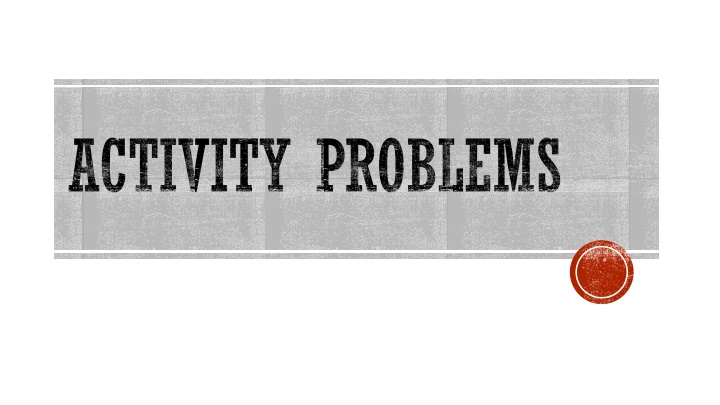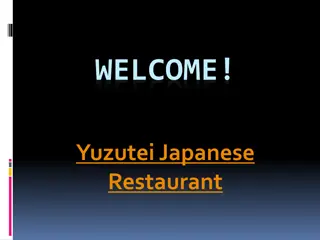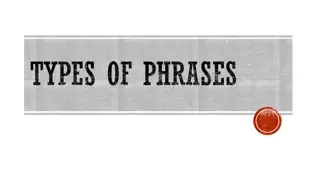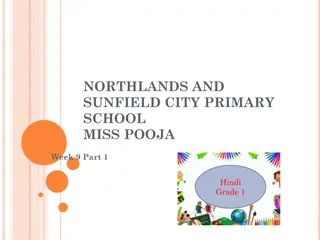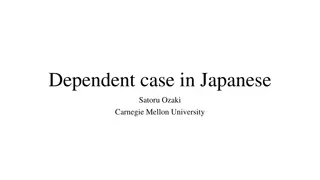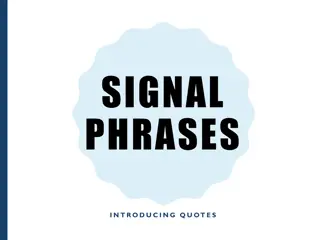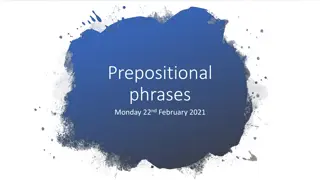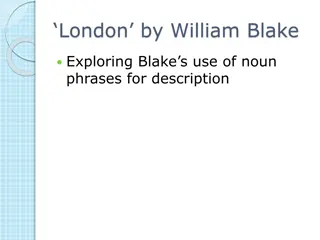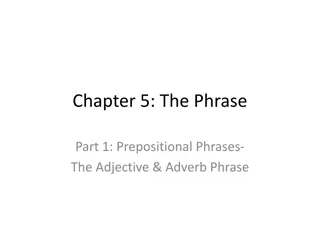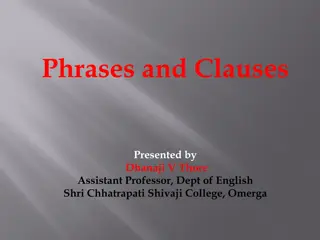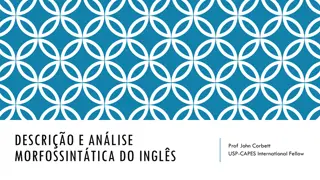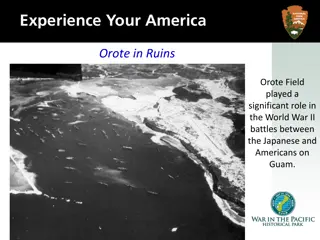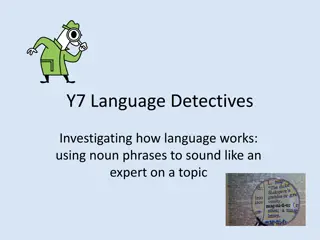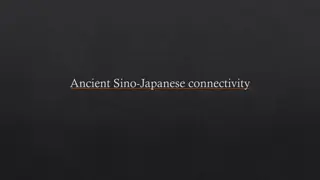Learning Basic Phrases in Hindi and Japanese
Explore basic phrases in Hindi and Japanese, including colors, requests, numbers, and school-related sentences. Practice translating simple sentences and identifying words in different contexts to enhance your language skills. Immerse yourself in the beauty of language learning with these engaging examples!
Download Presentation

Please find below an Image/Link to download the presentation.
The content on the website is provided AS IS for your information and personal use only. It may not be sold, licensed, or shared on other websites without obtaining consent from the author.If you encounter any issues during the download, it is possible that the publisher has removed the file from their server.
You are allowed to download the files provided on this website for personal or commercial use, subject to the condition that they are used lawfully. All files are the property of their respective owners.
The content on the website is provided AS IS for your information and personal use only. It may not be sold, licensed, or shared on other websites without obtaining consent from the author.
E N D
Presentation Transcript
Here are some sentences in Hindi, a language spoken in India. Jute laal hain. The shoes are red Jute safed hain. The shoes are white. Kameez laal hai. The shirt is red. How would you say The shirt is white in Hindi?
Phrase Alignment Phrase Translation How does Google Translate work? Jute laal hain The shirt Kameez The shoes are red hai is safed white Jute safed hain The shoes Ordering are white hai Kameez safed Kameez laal hai The shirt is red
Here are some sentences in Hindi, a language spoken in India. Chai dijie. Tea, please. Roti dijie. Bread, please. Chawal dijie. Rice, please. How would you say Water, please in Hindi? Hint: water = pani
Here are some sentences in Hindi, a language spoken in India. Char matchliyan hain. There are four fish. Char ladkiyan hain. There are four girls. Che matchliyan hain. There are six fish. How would you say There are six girls in Hindi?
Here are some sentences in Japanese. Just like in America, Japanese schools have many different levels. Emi wa chuugakusei desu. Emi is a middle school student. Ken wa daigakusei desu. Ken is a high school student. Sayuri wa shougakusei desu. Sayuri is an elementary school student. If the Japanese word for I is watashi, can you say what kind of student you are?
Here are some sentences in Japanese. Ritsu wa hana ga suki desu. Ritsu likes flowers. Chihiro wa hana ga suki jyanai. Chihiro doesn t like flowers. Asako wa ame ga suki desu. Asako doesn t like candy. Can you figure out what this Japanese sentence means? Mizuho wa ame ga ski desu.
Here are some sentences in Japanese. San ji desu. It is 3:00. Go ji han desu. It is 5:30. Roku ji desu. It is 6:00. You need to know what time it is, and your friend Erika just told you in Japanese! Can you figure out what she said? San ji han desu.
Here are some sentences in Spanish. El perro duerme. The dog sleeps. El perro come. The dog eats. El gato duerme. The cat sleeps. Can you figure out what this Spanish sentence means? El gato come.
Japanese uses a system of letters known as kanji. Each kanji has a specific meaning and pronunciation(s), and kanji can be combined to make new meanings. = now = day What do you think means?
Japanese uses a system of letters known as kanji. Each kanji has a specific meaning and pronunciation(s), and kanji can be combined to make new meanings. = middle = school, learning What do you think means?
Japanese uses a system of letters known as kanji. Each kanji has a specific meaning and pronunciation(s), and kanji can be combined to make new meanings. = outside = country What do you think means?
Japanese uses a system of letters known as kanji. Each kanji has a specific meaning and pronunciation(s), and kanji can be combined to make new meanings. = Japan = language What do you think means?
Japanese uses a system of letters known as kanji. Each kanji has a specific meaning and pronunciation(s), and kanji can be combined to make new meanings. = to eat = thing What do you think means?
? Fill in the blanks so that both phrases make sense! ? CREDIT _ _ _ _ GAME ICE _ _ _ _ _ CHEESE COUCH _ _ _ _ _ _ CHIP ?
SPEECH RECOGNITION: WHICH SEQUENCES OF WORDS ARE MORE PROBABLE? How to recognize speech. How to wreck an ice peach. How to wreck a nice beach. I sent out a request to my colleagues for an example from a real speech recognition or MT system.
? Fill in the blanks so that both phrases make sense! ? BASEBALL _ _ _ CAVE POOL _ _ _ _ _ HAT BOOK _ _ _ _ _ UP ? ?
Fill in the blanks so that both phrases make sense! ? MOVIE _ _ _ _ _ _ _ PARK AIR _ _ _ _ _ _ HERO ROCK _ _ _ _ GAZING ?
Maori is a language spoken by the aboriginal (native) people of Australia. Some words in Maori, called loanwords, are borrowed from English. Can you match each loanword to its picture? tuuru puutu puunu wuuru A B C D
HOW ARE LANGUAGES DIFFERENT FROM ENGLISH? Maori doesn t have consonant clusters like st in stool or cr in cream . Maori consonants are p, t, k, h, m, n, r, ng, and wh. But there is ch on the next slide. Maori words can begin with ng as in ngaa which can mean the (plural) or breath .
Some words in Japanese, called loanwords, are borrowed from English. Can you match each loanword to its picture? takushii pengin chiizu aisu kuriimu B C A D
Maori is a language spoken by the aboriginal (native) people of Australia. Some words in Maori, called loanwords, are borrowed from English. Can you match each loanword to its picture? haama waana maati haapa B D C A
Each of these newspaper headlines can have two different meanings! ? Can you figure out what they are? A. IRAQI HEAD SEEKS ARMS B. STOLEN PAINTING FOUND BY TREE ? C. KIDS MAKE HEALTHY SNACKS
Ambiguity is combinatoric I saw a man in a park on a hill with a telescope?
Professor Word has invented a machine to read the newspaper aloud, but it isnt working right! This ad it just read doesn t make any sense Do you love docks? We11 tick-tock, time is running out Sor dock wor1d s spring sale! We have watches, grandSather docks, and so much more! Whether you are a dock co11ector or just buying one Sor Sun, stop by dock wor1d today! Can you figure out which THREE MISTAKES the machine is making?
OPTICAL CHARACTER RECOGNITION Converts pictures of old books into searchable text. But it makes some mistakes.
You are in ANNINO Station in Moscow, Russia. You need to get off at the MITINO stop. Can you figure out which train to board just by looking at these Russian signs? Hint: The sign for ANNINO is in the Russian alphabet! 1 2 4 3
? Can you change ? BOB S RAFTS to BARB S CRAFTS ? in just FOUR moves?! ? Hint: one move = remove, add, or move a letter
THIS IS HOW YOUR SPELL CHECKER WORKS! Thes is hou yur spel cheaker wurks.
THEYOUTHEVENT How many ways can you break this into words? Some languages like Chinese and Japanese are written without spaces. I m waiting for a Chinese example from a student.
